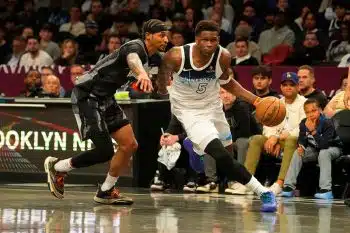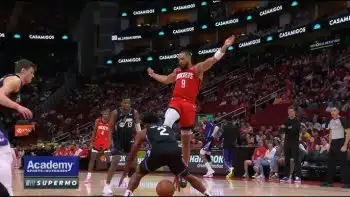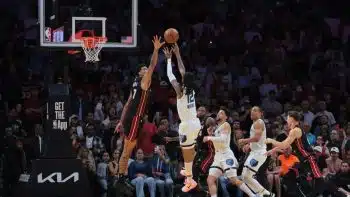NBA
Jayson Tatum Found Himself In Game 5 And Led The Celtics To A Title

Key Highlights
-
- Jayson Tatum dropped 31 points, 11 assists (two turnovers), eight rebounds and two steals in Game 5 to power the Boston Celtics past the Dallas Mavericks and win the 2023-24 NBA Finals
- Despite shooting 1-of-7 from beyond the arc, Tatum was 10-of-17 on two-pointers, including 8-of-11 at the rim
Jayson Tatum’s Game 5 started a lot like his previous few outings: slowly.
He left a finish short following a pirouette in the post. He airballed a pull-up long ball. He was turned back on a hard-charging drive to the cup. He settled for and clanked a turnaround fadeaway when only Luka Doncic interfered with his path to the hoop.
Just 7.5 minutes in and already 0-of-4, another dismal shooting performance — which understandably clouded an otherwise very good NBA Finals showing — seemed to await him. Instead, Tatum finished with 31 points (57.4 percent true shooting), 11 assists (two turnovers), eight rebounds and two steals. He converted 11 of his final 20 shots, despite netting 1 of his 6 triples during that span.
Roughly two hours after that rickety start, he and the Boston Celtics were atop the NBA, basking in the joy of a 106-88, Game 5 romp that brought them banner No. 18. He was the defining player of Monday’s closeout victory. He ended the game keeled over on the sideline, comforted by longtime teammate Al Horford reminding him of his new, impending title, “You’re a champ! You’re a champ!” and celebrating with his son, Deuce, telling him “We did it! We did it!”
As a scorer, these Finals were not a coronating five-game stretch for Tatum. He labored immensely, featuring 6-of-22, 6-of-16, and 4-of-10 nights; even his best performances were 11-of-24 and 11-of-26, the latter of which involved a 4-of-13 struggle from deep. He averaged 22.2 points on 50.5 percent true shooting.
Yet in Game 5, with the Larry O’Brien Trophy attainable on the TD Garden floor, the star wing found himself and showcased how far he’s come since he first announced himself as a vital member of the title-contending Celtics.
Through Tatum’s first three seasons, he was an absolute marksman, converting 40.1 percent from three-point range. He looked ready to assert himself as one of the league’s next great wing shooters. Those credentials, though, masked some pretty glaring shortcomings inside the arc that prevented him from being a complete scorer. He shot just 48.4 percent on two-pointers, headlined by weak, inflexible, flawed finishing.
Across those three seasons, per Cleaning the Glass, he twice ranked in the 35th percentile or lower around the rim among forwards and made 60.3 percent of those shots over that span. In the ensuing four years, he’s built himself into a premier finisher whose outside stroke has declined; he’s shot 36.4 percent from three and 69.6 percent at the basket, never placing below the 69th percentile around the rim.
Those divergent trajectories met Monday. They both impeded Tatum’s scoring ceiling and provided him a runway to flourish when his sprawling, elongated release abandons him like it did that night.
Whether it was from outside or merely any sort of jumper, he could not find a reliable means of scoring as a shooter. On looks beyond 4 feet, he was 3-of-13. At the rim, however, he was a tidy 8-of-11 and ended the postseason at 69.4 percent — a stark contrast to his 28.3 percent three-point mark. In the Finals, he went 24-of-37 (64.9 percent) around the hoop and 10-of-38 (26.3 percent) from deep. In the regular season, he shot a career-high 72 percent at the rim (83rd percentile) and 37.6 percent on threes.
Ten of his last 20 shots came at the rim Monday. He made eight of them.
Time and time again, with no true worry of the primary defender, he massaged his way to the hoop. According to NBA.com, he recorded 25 drives with a series-best 18 points and three assists on those forays. Entering Game 5, he was averaging 6.8 points and 1.5 assists on 17.8 drives in the Finals. As a rookie, he averaged 5.7 drives per game.
He absorbed contact. He sprung free small openings with slippery dribble combos, savvy footwork and a loping package of limbs. He battered his shoulders through defenders to make space when there wasn’t any. Functional, weaponized strength that years ago seemed like the pipe dream of cliched optimism forged him through Maverick after Maverick for buckets.
Doncic, Dereck Lively II, Daniel Gafford, Josh Green, PJ Washington, Maxi Kleber — he wiggled past all of them, as if each marked another lap on the track inching him toward his first title.

The lanky, inexperienced, precocious Tatum could not have thrived like he did in Game 5. If the jumper called out sick, he couldn’t recalibrate. Heck, the Tatum of two years ago — a recently crowned All-NBA First Team wing appearing in his inaugural Finals — could not have thrived like he did in Game 5.
In a six-game defeat, that Tatum averaged 21.5 points on 48.1 percent true shooting, buoyed by 45.5 percent three-point shooting. He made 9-of-17 field goals at the rim and 24-of-76 twos (31.6 percent). Anchored by Draymond Green, the Golden State Warriors‘ defense may have been stiffer than Dallas’, which was a very good defense in its own right. But Tatum’s individual development is the impetus for his Game 5 more than any surrounding component (added spacing, different defensive matchup, etc.).
That Tatum also did not process the floor as a playmaker like this version. Many of the same reads and deliveries existed, and it’s not as though he’s become a savant-level passer now. But the speed with which he executed countless sound decisions stirred the offense as Boston’s engine. Once reliably rattled by punctual help or rangy limbs, he saw similar approaches this round and punished them.
Back in 2021-22, he racked up 42 assists and 23 turnovers against the Warriors, and 148 assists to 100 turnovers throughout the entire postseason. This year, he logged 36 dimes to 16 turnovers in the Finals (2.25 assist-to-turnover ratio), punctuated by 11 helpers to two giveaways in Game 5. It capped off the foremost playoff run of his career as a passer (119 assists, 50 turnovers, 2.38 A/TO ratio).
Boston’s elite spacing does not demand the passing creativity of Doncic, Trae Young or Nikola Jokic. But any efficient offense nonetheless demands trustworthy precision from its primary decision-makers based on how a defense bends to their presence.
For much of this series and postseason, Tatum nailed those requirements. Two of the three highest assist totals of his 113-game playoff career occurred in the 2024 Finals, including Game 5. He quickly acknowledged how Dallas’ defenders engaged with his orbit and capitalized.

In two of the Celtics’ four wins, Tatum’s superlatives resided in role player qualities: rebounding, snappy decision-making, and defensive chops. On the loudest of stages, his scoring dipped far below the standard he’s established for himself as one of the league’s preeminent players. The subtleties of his game continued popping and ensured he was impactful, but not to star player degrees — particularly not to the caliber of a three-time All-NBA First Team honoree.
In Game 5, all of it intersected. He scored effectively. He set up teammates. He snared eight boards. He plucked two steals. He shored up gaps in help. He wrangled at the point of attack.
There was plenty of stuff that resembled the promising 19-year-old who was third in Rookie of the Year voting and posterized LeBron James during Game 7 of the Eastern Conference Finals six years ago. But there was also plenty of stuff underscoring his evolution into a much better and much different player.
A star who’s not grown into an elite shooter, nor someone fastened to the three-ball’s volatility. He’s a methodically imposing driver, shrewd, high-level facilitator and, most relevantly after Monday’s efforts, an NBA champion — just like all his teammates and many of the Celtic luminaries preceding him.











